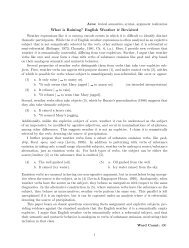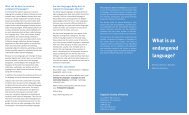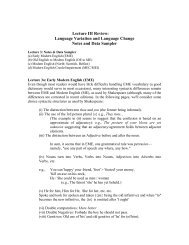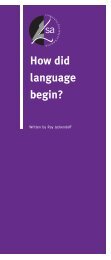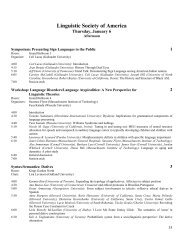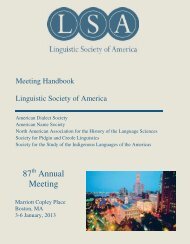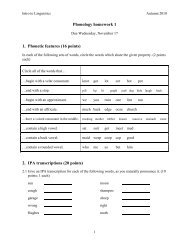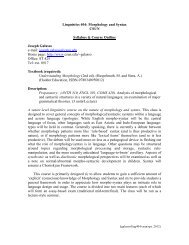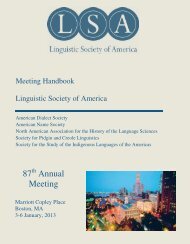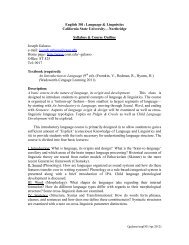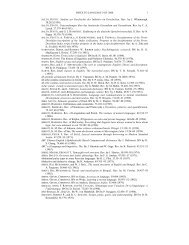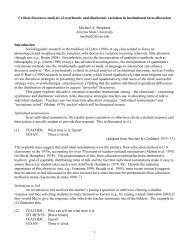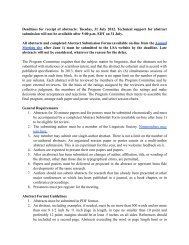Friday, 5 JanuarySymposiumEndangered Languages and <strong>Linguistic</strong> TheoryCalifornia C2:00 – 5:00 PMOrganizer:Sponsor:Participants:Alice C. Harris (University at Stony Brook, State University <strong>of</strong> New York)Committee on Endangered Languages and Their PreservationStephen R. Anderson (Yale University)Mark C. Baker (Rutgers University)Juliette Blevins (Max Planck Institute for Evolutionary Anthropology, Leipzig)Heidi Harley (University <strong>of</strong> Arizona)Sally McConnell-Ginet (Cornell University)Maria Polinsky (University <strong>of</strong> California, San Diego)In recent years <strong>the</strong>re has been much discussion among linguists as well as o<strong>the</strong>rs about <strong>the</strong> problems <strong>of</strong> endangered languages.Meetings are held regularly on this topic, and many books have now been published on a variety <strong>of</strong> aspects <strong>of</strong> <strong>the</strong> problem, especiallycauses, human rights, <strong>the</strong> humanitarian impact, and means <strong>of</strong> revitalization. The LSA’s Committee on Endangered Languages andTheir Preservation (CELP) has also sponsored several forums on issues related to endangered languages.The topic <strong>of</strong> this particular symposium was inspired in part by <strong>the</strong> topic <strong>of</strong> <strong>the</strong> 2007 <strong>Linguistic</strong>s Institute, “Empirical Foundations forTheories <strong>of</strong> Language”. In this symposium we emphasize those empirical foundations that rest on data from endangered languages.Data from endangered languages have repeatedly provided challenges to linguistic <strong>the</strong>ory and in this way have helped to shaped it.Language is a uniquely human faculty, and one <strong>of</strong> <strong>the</strong> concerns <strong>of</strong> linguists is to determine <strong>the</strong> limits <strong>of</strong> <strong>the</strong> human language capacity,<strong>the</strong> extent to which languages can vary. The ability to determine <strong>the</strong>se limits accurately is crucially limited by what is known <strong>of</strong> <strong>the</strong>variety actually found in languages <strong>of</strong> <strong>the</strong> world. The variety that has developed in languages is <strong>the</strong> natural laboratory within whichlinguists conduct <strong>the</strong>ir research. If only <strong>the</strong> 10 languages with <strong>the</strong> largest numbers <strong>of</strong> speakers survive, <strong>the</strong> constraints on <strong>the</strong> research<strong>of</strong> linguists would be comparable to that <strong>of</strong> biologists if only <strong>the</strong> top 10 predators had survived among all living animals. Withoutvariety, we might be unaware that birds could survive without flying, or we might not even be aware that wings could evolve! Aslinguists, we need all <strong>the</strong> data we can get on <strong>the</strong> full range <strong>of</strong> possible languages. The next fact from a language spoken by hardlyanyone could change our model <strong>of</strong> what language can be and could improve <strong>the</strong> questions we must ask in investigating all languages.Our knowledge <strong>of</strong> how language in general works is based on <strong>the</strong> accumulation and integration <strong>of</strong> facts from languages large andsmall from all over <strong>the</strong> world.Speakers summarize ways data from endangered languages have contributed to <strong>the</strong>ir own <strong>the</strong>oretical work or to <strong>the</strong>oretical work in<strong>the</strong>ir subfield <strong>of</strong> linguistics. The symposium opens with a brief introduction by Sally McConnell-Ginet and proceeds to JulietteBlevins’ overview <strong>of</strong> <strong>the</strong> importance <strong>of</strong> data from a broad range <strong>of</strong> endangered languages for phonological <strong>the</strong>ory. Heidi Harleydiscusses <strong>the</strong>oretical questions raised by affixation, and Stephen R. Anderson addresses several issues at <strong>the</strong> morphology-syntaxinterface for which evidence from endangered languages has played a key role. Mark Baker speaks on <strong>the</strong> question “What if <strong>the</strong>rewere no noun-incorporating languages?”. The last speaker, Maria Polinsky, addresses <strong>the</strong> relevance <strong>of</strong> evidence from severalendangered languages, including Tsez, Malagasy, and Kabardian, in characterizing backward subject control.81
Stephen R. Anderson (Yale University)Clitics, <strong>the</strong> morphology-syntax interface, & <strong>the</strong> evidential value <strong>of</strong> endangered languagesI summarize three instances in which evidence from endangered languages provides crucial evidence for <strong>the</strong> <strong>the</strong>ory <strong>of</strong> clitics: (1)Kwakw'ala shows that <strong>the</strong> affiliation <strong>of</strong> clitics can be driven by phonological considerations ra<strong>the</strong>r than by <strong>the</strong>ir syntax. (2) NiasSelatan and Kuuk Thaayorre show that phrasal properties can in some instances be realized by <strong>the</strong> word-level inflectional morphology<strong>of</strong> a peripheral element. (3) Subject clitics in <strong>the</strong> Surmiran form <strong>of</strong> Rumantsch leads to <strong>the</strong> conclusion that quite separate aspects <strong>of</strong>grammatical organization can lead independently to surface ‘verb-second’ patterns. Endangered languages supply indispensableevidence that enriches our conception <strong>of</strong> <strong>the</strong> nature <strong>of</strong> grammatical structure.Mark C. Baker (Rutgers University)What if <strong>the</strong>re were no noun-incorporating languages?Linguists are tempted to hope that <strong>the</strong> endangered languages are a random sample <strong>of</strong> <strong>the</strong> existing languages, so <strong>the</strong>ir extinction maynot warp our work too much. I show <strong>the</strong> dubiousness <strong>of</strong> this hope by first reviewing <strong>the</strong> considerable impact that <strong>the</strong> study <strong>of</strong> nounincorporation has had on <strong>the</strong> development <strong>of</strong> <strong>the</strong>oretical morphosyntax. Next I show that, <strong>of</strong> eight languages that have contributedsignificantly to <strong>the</strong> debate, all but two are endangered--and those two have <strong>the</strong> same subtype <strong>of</strong> incorporation. Such a limited samplewould not permit rich <strong>the</strong>oretical conclusions to be drawn in this domain.Juliette Blevins (Max Planck Institute for Evolutionary Anthropology, Leipzig)Endangered sound patterns: Some mutually feeding relationshipsPhonological <strong>the</strong>ory, from early distinctive features, to recent emergentist proposals, maintains a solid grounding in endangeredlanguages. The typological and genetic diversity informing <strong>the</strong> study <strong>of</strong> sound patterns is amply represented in research articles andintroductory textbooks. With this grounding, phonological <strong>the</strong>ory has been able to <strong>of</strong>fer descriptive linguists new questions,paradigms, and techniques inspired by current models and hypo<strong>the</strong>ses. I highlight cases where work on endangered languages hasinformed and transformed phonological <strong>the</strong>ory and o<strong>the</strong>rs where phonological <strong>the</strong>ory has been <strong>the</strong> catalyst for insightful descriptions<strong>of</strong> endangered languages and <strong>the</strong> source <strong>of</strong> <strong>the</strong>oretically challenging discoveries.Heidi Harley (University <strong>of</strong> Arizona)What does affixation mean? Some <strong>the</strong>oretical questions raised by complex verbs in Hiaki (Yaqui)Hiaki (Yaqui) exhibits a great deal <strong>of</strong> verbal compounding behavior, including obligatorily bound 'light verb' affixes <strong>of</strong> both familiarand less familiar types and, also, interestingly optionally bound complement-taking verb/affix 'hybrids', which may stand alone orsuffix to <strong>the</strong> verb <strong>of</strong> <strong>the</strong>ir complement clause. I examine <strong>the</strong> implications <strong>of</strong> <strong>the</strong>se hybrids for both morphological and syntactic<strong>the</strong>ory. It seems cross-linguistically that structures that require affixation in language X may be realized by isolating, 'syntactic'constructions in language Y. What about <strong>the</strong> converse? Are <strong>the</strong>re structures that may not be realized by affixation? What doesaffixation mean, if anything, for <strong>the</strong> syntax?Maria Polinsky (University <strong>of</strong> California, San Diego/Harvard University)Is sluicing universal? Evidence from <strong>the</strong> fieldI examine <strong>the</strong> interaction between linguistic <strong>the</strong>ory and endangered languages through <strong>the</strong> prism <strong>of</strong> sluicing. I present novel fieldworkdata from Aghem (wh-movement language) and Circassian (wh-in-situ language), nei<strong>the</strong>r <strong>of</strong> which has sluicing, thus appearing ascounterexamples to <strong>the</strong> claim that sluicing is universal (Merchant 2001). I show that <strong>the</strong> absence <strong>of</strong> sluicing is related to a moregeneral restriction against embedded CPs, independently motivated in both languages. Sluicing is allowed as long as <strong>the</strong> CP appearsas <strong>the</strong> matrix clause, in fragments. These findings bear on <strong>the</strong> <strong>the</strong>oretical issues <strong>of</strong> external merge (Pesetsky&Torrego 2004) and <strong>the</strong>typology <strong>of</strong> sluicing.82
- Page 1:
MEETING HANDBOOKLINGUISTIC SOCIETY
- Page 5 and 6:
Meeting RoomsSECOND FLOORFOURTH FLO
- Page 7:
• LSA: Business Meeting and Award
- Page 11 and 12:
LSAThursday, 4 JanuaryEveningWelcom
- Page 13 and 14:
Friday MorningLSAConstructions and
- Page 15 and 16: LSAFriday, 5 JanuaryAfternoonInvite
- Page 17 and 18: Friday AfternoonLSAModeling Acquisi
- Page 19 and 20: LSARules for Motions and Resolution
- Page 24 and 25: LSASaturday AfternoonSymposium: Par
- Page 26 and 27: LSASaturday AfternoonSyntactic Face
- Page 28 and 29: LSASunday MorningFirst Language Acq
- Page 30 and 31: American Dialect SocietyThursday, 4
- Page 32 and 33: ADSSaturday, 6 JanuaryMorningSessio
- Page 34 and 35: American Name SocietyThursday, 4 Ja
- Page 36 and 37: ANSFriday AfternoonForms of Address
- Page 38 and 39: ANSSaturday AfternoonHistorical Ono
- Page 40 and 41: Society for Pidgin and Creole Lingu
- Page 42 and 43: SPCLSaturday, 6 JanuaryMorningSpeci
- Page 44 and 45: Society for the Study of the Indige
- Page 46 and 47: SSILAFriday AfternoonPhonology and
- Page 48 and 49: SSILASunday, 7 JanuaryMorningSemant
- Page 50 and 51: Part 1: Thursday, 4 JanuaryPart 2:
- Page 52 and 53: Donca Steriade (Massachusetts Insti
- Page 54 and 55: Friday, 5 JanuaryPlenary AddressCal
- Page 56: Saturday, 6 JanuaryPresidential Add
- Page 59 and 60: Thursday, 4 JanuaryTutorialA Field
- Page 61 and 62: Thursday, 4 JanuarySymposiumContinu
- Page 63 and 64: Friday, 5 JanuarySymposiumApproache
- Page 65: Friday, 5 JanuaryDigital Poster Ses
- Page 69 and 70: David Bowie (University of Central
- Page 71 and 72: Sharon Peperkamp (CNRS/University o
- Page 73 and 74: Elena Guerzoni (University of South
- Page 75 and 76: Claire Bowern (Rice University)Morp
- Page 77 and 78: Lise Dobrin (University of Virginia
- Page 79 and 80: We discuss the analysis of the vowe
- Page 81 and 82: Brian Agbayani (California State Un
- Page 83 and 84: squiggly shapes). Disfluency made n
- Page 85 and 86: Adam Baker (University of Arizona)
- Page 87 and 88: final particle; this structure enco
- Page 89 and 90: Travis G. Bradley (University of Ca
- Page 91 and 92: demonstrated that 2-year-olds map n
- Page 93 and 94: Nancy J. Caplow (University of Cali
- Page 95 and 96: Sarah Churng (University of Washing
- Page 97 and 98: Jennifer Culbertson (Johns Hopkins
- Page 99 and 100: Scott Drellishak (University of Was
- Page 101 and 102: Marc Ettlinger (University of Calif
- Page 103 and 104: Scherre 2001 argue that the phenome
- Page 105 and 106: Cynthia A. Fox (University at Alban
- Page 107 and 108: structures to the double object con
- Page 109 and 110: Steven Gross (East Tennessee State
- Page 111 and 112: Heidi Harley (University of Arizona
- Page 113 and 114: equivalents. I argue that their sim
- Page 115 and 116: predictable, and/or restricted in d
- Page 117 and 118:
Keith Johnson (University of Arizon
- Page 119 and 120:
Andrew Kehler (University of Califo
- Page 121 and 122:
comparative rate of acquisition acr
- Page 123 and 124:
Pei-Jung Kuo (University of Connect
- Page 125 and 126:
EunHee Lee (University at Buffalo,
- Page 127 and 128:
Brook Danielle Lillehaugen (Univers
- Page 129 and 130:
Martha J. Macri (University of Cali
- Page 131 and 132:
Spanish subjects with unaccusative
- Page 133 and 134:
Brad Montgomery-Anderson (Universit
- Page 135 and 136:
multi-ethnic configuration, and pos
- Page 137 and 138:
Natalie Operstein (University of Ca
- Page 139 and 140:
Nick Pharris (University of Michiga
- Page 141 and 142:
Anastasia Riehl (Cornell University
- Page 143 and 144:
Françoise Rose (CNRS-IRD) Session
- Page 145 and 146:
precedence also constrains stative
- Page 147 and 148:
use experimental and corpus techniq
- Page 149 and 150:
eads easily for astrophysicists.).
- Page 151 and 152:
domains of use are mostly complemen
- Page 153 and 154:
show that both concatenative and no
- Page 155 and 156:
Don Walicek (University of Puerto R
- Page 157 and 158:
positions. However, certain matrix
- Page 159 and 160:
Suwon Yoon (University of Chicago)



